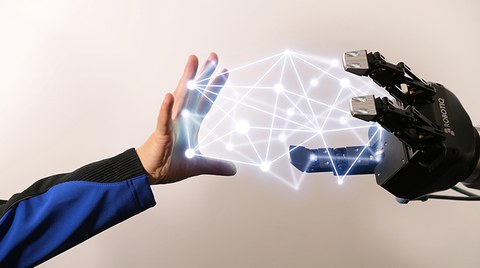Projekte
Inhaltsverzeichnis
Die zukunftsorientierte und visionäre Forschung der Fakultät spiegelt sich in einer Vielzahl an Industrie-, DFG- und Verbundprojekten wider.
Die Fakultät Informatik ist maßgeblich an herausragenden kollaborativen Forschungszentren und Großprojekten beteiligt.
Forschungszentren
ScaDS.AI (Center for Scalable Data Analytics and Artificial Intelligence) Dresden/Leipzig ist ein Zentrum für Data Science, Künstliche Intelligenz und Big Data mit Standorten in Dresden und Leipzig. Es ist eines der fünf neuen KI-Zentren in Deutschland, die im Rahmen der KI-Strategie der Bundesregierung durch das Bundesministerium für Bildung und Forschung und den Freistaat Sachsen gefördert werden. ScaDS.AI Dresden/Leipzig ist als dauerhafte Forschungseinrichtung an beiden Standorten etabliert und eng mit den lokalen Universitäten verbunden: der TU Dresden und der Universität Leipzig.
Finanzierung: Bundesministerium für Bildung und Forschung (BMBF)
Sächsisches Staatsministerium für Wissenschaft, Kultur und Tourismus (SMWK)
Die TU Dresden und die Technische Universität München haben sich zum Forschungszentrum 6G-life zusammengeschlossen, um die Spitzenforschung für zukünftige 6G-Kommunikationsnetze mit dem Fokus auf Mensch-Maschine-Kollaboration voranzutreiben. Der Zusammenschluss der beiden Exzellenzuniversitäten bündelt ihre weltweit führenden Vorarbeiten in den Bereichen Taktiles Internet im Exzellenzcluster CeTI, 5G-Kommunikationsnetze, Quantenkommunikation, Post-Shannon-Theorie, Methoden der künstlichen Intelligenz sowie adaptive und flexible Hard- und Softwareplattformen.
Finanzierung: Bundesministerium für Bildung und Forschung - BMBF
Laufzeit: 15.08.2021 - 14.08.2025
Else Kröner Fresenius Zentrum für Digitale Gesundheit
2019 gegründet, wird das EKFZ von der Else Kröner-Fresenius-Stiftung mit 40 Millionen Euro für zehn Jahre gefördert. Das Zentrum fokussiert seine Forschung auf innovative, medizinische und digitale Technologien an der Schnittstelle zur Klinik. Es bündelt die Expertise von Medizin- und Hightech-Spezialisten und bringt sie durch seine interdisziplinäre Struktur und sein Netzwerk zusammen. Das Ziel des EKFZ ist es, eine neue Generation von Ärzten mit umfassenden technischen Kenntnissen und Fähigkeiten und umgekehrt Ingenieure mit einem tiefen Verständnis für die Bedürfnisse von Medizin und Patienten zu fördern.
Hochleistungsrechnen wird an deutschen Hochschulen seit 2021 durch den NHR-Verbund strukturiert. Ziel ist es, den Forschenden bedarfsgerecht die für ihre Forschung benötigte Rechenkapazität zur Verfügung zu stellen und ihre Kompetenzen zur effizienten Nutzung zu stärken. Als eines der 9 NHR-Zentren in Deutschland ist das ZIH auf datengetriebenes HPC sowie Hochleistungsdatenanalyse spezialisiert und unterstützt die Methodenentwicklung in den Bereichen durch HPC-Architekturen mit dedizierten Speicher- und Rechenkonzepten. Im Anwendungsbereich liegen die NHR-Schwerpunkte des ZIH auf Lebenswissenschaften und Erdsystemwissenschaft.
Finanzierung: Bund und Länder
Laufzeit: 2021 - 2031
Das Zentrum für Systembiologie Dresden (CSBD) ist eine Kooperation des Max-Planck-Instituts für molekulare Zellbiologie und Genetik (MPI-CBG), des Max-Planck-Instituts für Physik komplexer Systeme (MPI-PKS) und der TU Dresden. Das interdisziplinäre Zentrum vereint Physiker:innen, Informatiker:innen, Mathematiker:innen und Biolog:innen unter einem Dach. Die Wissenschaftlerinnen und Wissenschaftler entwickeln gemeinsam computergestützte und theoretische Methoden, um biologische Systeme besser zu verstehen.
Exzellenzcluster
Die zentrale Vision des Center for Tactile Internet (CeTI) ist es, Menschen zu befähigen, in Quasi-Echtzeit mit cyber-physischen Systemen (CPS) in der realen oder virtuellen Welt über intelligente Wide-Area Kommunikationsnetzwerke zu interagieren. Solche Fortschritte gehen weit über den aktuellen Stand der Technik in den Computer- und Ingenieurwissenschaften hinaus: Intelligente Kommunikationsnetze und adaptive CPS für Quasi-Echtzeit-Kooperationen mit dem Menschen erfordern gegenseitige Online-Lernmechanismen, die eine entscheidende Herausforderung darstellen.
Wie formen die Gesetze der Physik das Leben? Mithilfe der Physik können wir die nicht lebendige Welt um uns herum verstehen. Aber die lebende Materie birgt noch viele Geheimnisse. Das Exzellenzcluster „Physik des Lebens“ (POL) erforscht die Schnittstelle von Biologie und Physik und will die physikalischen Prinzipien aufdecken, die der dynamischen Organisation des Lebens zugrunde liegen.
Sonderforschungsbereich
Das Ziel des Sonderforschungsbereiches SFB/TRR-248 „Grundlagen verständlicher Software-Systeme“ ist Grundlagenforschung für eine verständliche und nachvollziehbare cyber-physische Welt. Je mehr cyber-physischen Technologien unser Leben durchdringen und bestimmen, desto wichtiger wird es für unser Verständnis und die Kontrolle, das diese ihre Funktionalität und ihr Verhalten erläutern.
Finanzierung: Deutsche Forschungsgemeinschaft (DFG)
Laufzeit: 2019 - 2026
School of Embedded Composite Artificial Intelligence (SECAI)
SECAI ist ein Projekt der TU Dresden und Universität Leipzig zur Förderung der KI in Forschung und Ausbildung. Als DAAD Zuse School of Excellence in AI integriert SECAI Studium, Forschung und Anwendung durch die Förderung Studierender, Ausbau der Lehre, Finanzierung von Forschenden und Unterstützung internationaler Vernetzung. SECAI wird geleitet von der Entwicklung neuer KI-Methoden, die Vorteile bisher separater Ansätze kombinieren ("composite"), und der Integration von KI-Algorithmen in maßgeschneiderte Mikroelektronik und intelligente Geräte ("embedded").
Förderung: Bundesministerium für Bildung und Forschung (BMBF), DAAD
Laufzeit: 07/2022 – 12/2027
Future Robotics Lab
Im Jahr 2040 werden viele robotergestützte Produkte, Dienstleistungen und Lösungen unsere Gesellschaft weltweit unterstützen. Roboter werden unsere Welt revolutionieren und viel mehr Aufgaben des täglichen Lebens automatisieren als heute. Das Future Robotics Lab hat es sich zur Aufgabe gemacht, Methoden, Technologien und Anwendungen für diese robotische Revolution zu erforschen.
Forschungsprojekte an den Professuren
Die zahlreichen Forschungsprojekte an der Fakultät Informatik decken das gesamte Spektrum dieses Fachgebietes ab – von der angewandten bis zur theoretischen Informatik.
Die Forschungsprojekte der Professuren finden Sie jeweils auf den Web-Seiten der Professur und im Forschungsinformationssystem der TU Dresden.










